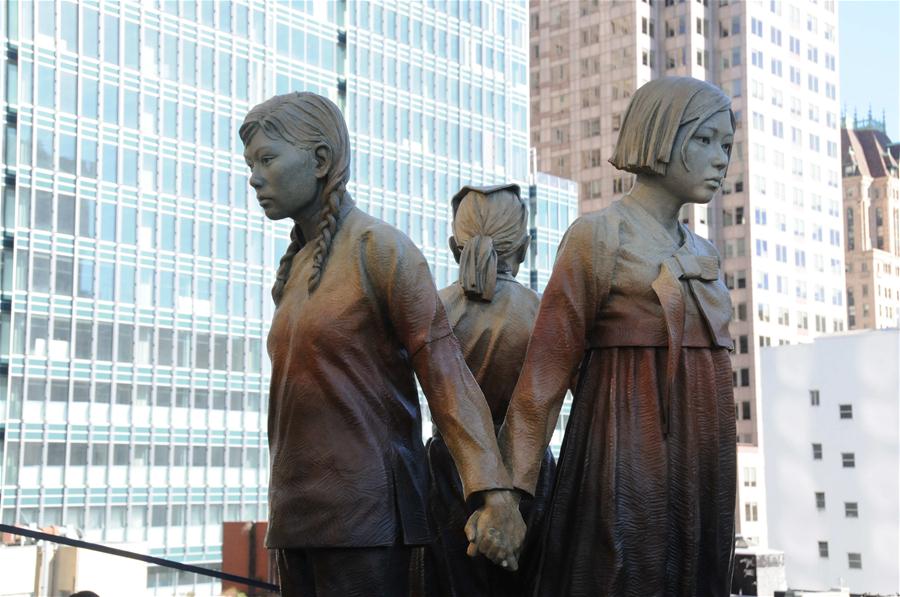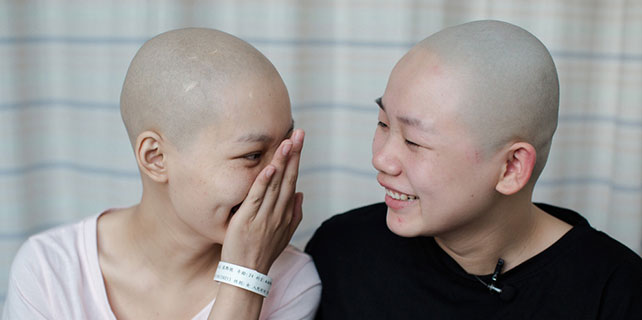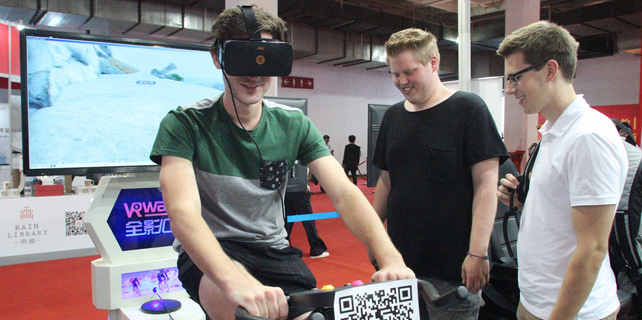'Comfort women' memorial unveiled in San Francisco
 |
|
A "comfort women" monument is seen at St. Mary Square in San Francisco, the United States, on Sept 22, 2017. Comfort Women Justice Coalition, a local grassroots advocacy group devoted to bring justice for the victims of Japanese military sexual slavery during the World War II, unveiled a monument dedicated to the "comfort women" in San Francisco on Friday. [Photo/Xinhua] |
SAN FRANCISCO - "I hate the crime, not the people," an emotional Yong-Soo Lee, a Korean woman who survived the sexual slavery by the Imperial Army of Japan during World War II, told a packed audience at a corner of a public square.
It was not the first time for Lee, aged 89, to make such a statement. She had spoken before in front of local and national legislative bodies as well as national and international human rights committees, and to reporters, about presumably the largest-scale crime specifically targeting women in human history.
At St. Mary's Square Annex in the city on the US West Coast, Lee witnessed the unveiling of a memorial called the "Comfort Women" Column of Strength on Friday. The face of the sculpture depicted Kim Haksoon, a Korean woman forcefully taken at the age of 17 by Japanese soldiers and confined to a "comfort station".
Kim died in December 1997 at the age of 73.
Kim was the first among the surviving "comfort women", a euphemism for the hundreds of thousands of girls and women in 13 Asia-Pacific countries or regions who were forced into sexual slavery by the Japanese army from 1930 to 1954, to go public in front of television cameras about her story in August 1991.
Lee followed in June 1992, telling about her sufferings which started at the age of 16.
It was not the first time for Lee, now an activist, to travel around the world to tell people what it means for her to seek justice, especially for those who did not survive to hear a formal apology from the Japanese government.
Historians believe that as many as 200,000 women, mostly from the Korean Peninsula as well as from China and Southeast Asian nations, were forced into sex enslavement for Japanese soldiers during the devastating war. However, those who deny history in Japan denigrate them as "paid prostitutes" or "willing volunteers."
The unveiling of the "comfort women" memorial, the first in a major city in the United States, which also includes a sculpture of three girls -- Korean, Chinese and Filipino -- took place on the second anniversary of a resolution passed by San Francisco city and the county's legislative Board of Supervisors. Besides calling for putting up the memorial, the resolution aimed at raising public awareness against sex trafficking and all forms of sexual violence.
At the unveiling ceremony, Eric Mar, a former board member who initiated the process, choked back tears when he said that he has a 17-year-old daughter and that Lee's courage to stand up against sexual violence and historical crimes is an inspiration for people fighting for justice.
Mike Honda, a former member of the US House of Representatives, who as the chief sponsor of a July 2007 House resolution urged Japan to acknowledge and accept responsibility for the sexual exploitation of "comfort women," joined elected officials at the event to greet Lee and denounce those who deny history.
The memorial is a gift from the "Comfort Women" Justice Coalition, or CWJC, a local grassroots advocacy group consisting of more than 30 multi-ethnic community organizations.
In a statement released on the occasion, the CWJC said that "through our memorial, we remember all our grandmothers who are alive, and all those who have passed on but are still with us in both spirit and memory."
Julie Tang and Lillian Sing, both judges of the Superior Court of San Francisco County who retired two years ago and co-chair the CWJC, vowed to erect more memorials around the United States.
Tang told Xinhua that during 26 years as a judge, she had to "make sure in each case that if somebody committed a crime, the person would be held accountable." However, in the instance of "comfort women," the criminals "went away and got free, there was no justice for the comfort women."
Asked what the memorial means for her, Sing pointed at herself and at reporters at a press briefing, saying that it reflects the soul of everybody with a conscience.
"It is my soul, it is your soul, and it should be the soul of everybody," she said.
















